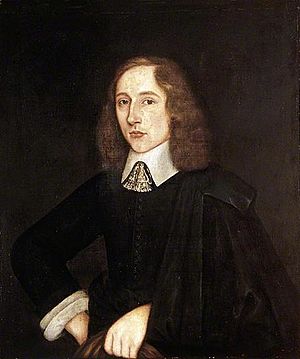John Fowke facts for kids
John Fowke (born around 1596 – died April 22, 1662) was an important English merchant and politician. He held significant positions in London, serving as the Sheriff of London in 1644 and later as the Lord Mayor of London in 1652. He also represented the City of London in Parliament from 1661 to 1662.
Contents
Early Life and Business
John Fowke was born in Tewkesbury, a town in Gloucestershire, England. He was the third son of William Fowke. John later moved to London and became a very successful merchant. He was a member of the Haberdashers' Company, which was a powerful trade group, and also an alderman, a senior member of the city council.
Standing Up to the King
In 1627, John Fowke faced a big challenge. The House of Commons (a part of Parliament) had decided that people shouldn't have to pay a certain tax called "tonnage and poundage" to King Charles I. John Fowke bravely refused to pay this tax.
Because he refused, the King's officers seized many of his goods, worth a lot of money. When he tried to get his goods back through legal means, he was put in prison. The King's court, called the Star Chamber, even tried to accuse him of serious crimes. King Charles I himself spoke out against Fowke.
In 1629, Fowke again refused to pay the tax. He was arrested and sent to the Fleet Prison. His ship and its cargo were also taken. He was forced to pay a huge amount of money.
Years later, in 1641, Fowke asked Parliament for help to get back what he had lost. Parliament agreed and set up a committee to make sure he was repaid from the estates of those who had wronged him.
During the English Civil War
John Fowke became Sheriff of London in 1643. King Charles I saw him as one of the main leaders of the Parliament's supporters in London. The King even called him a "traitor."
Parliament trusted Fowke. They made him one of the people in charge of collecting money to support their side in the war. He also became a commissioner for customs, which meant he managed taxes on goods coming into the country.
At one point, Fowke was briefly sent to the Fleet Prison again because he wouldn't give a sworn account of the money he had received. However, the city council and his friends worked hard to get him released.
Fowke was highly respected by both sides, even when they disagreed with him. He successfully challenged old court decisions that had caused him to lose money to the East India Company.
After the First Civil War
After the first part of the Civil War, there was a struggle between Parliament and the army. In 1647, Fowke was initially removed from a committee that managed London's military forces. However, when the army approached London, he was chosen to lead a group to speak with the army's general, Thomas Fairfax. Soon after, he was put back on the military committee.
In 1648, Fowke presented a petition to Parliament asking for peace. He also gave a speech, hoping that Parliament would find a way to secure peace for the country. When the army returned to London, Fowke helped keep the city calm.
Under the Commonwealth Government
During the time England was a republic (the Commonwealth), Fowke bought land that used to belong to bishops. He was even named as one of the judges for the King's trial, but he chose not to attend.
In 1651, a parliamentary committee decided that Fowke should receive a large amount of money as compensation for his past losses. They suggested giving him land in Essex worth £500 a year forever. This plan was approved. He also received £5,000 from fines collected by the government.
From 1652 to 1653, John Fowke served as the Lord Mayor of London, a very important role. He also helped sell the King's goods and advised the government on how to manage royal forests for the benefit of the state.
The Restoration of the Monarchy
When it became clear that the monarchy would be restored, Fowke quickly denied that he had been one of the judges who tried King Charles I. He even got a certificate to prove he hadn't actively participated.
For a while, he lived quietly at his country home in Clayberry, Essex. However, he was still very popular. In 1661, he was elected as a Member of Parliament for the City of London again, receiving the most votes.
In the same year, he became the president of Christ's Hospital, a famous school. He was very generous to both Christ's Hospital and Bethlehem Hospital, another important institution. John Fowke died on April 22, 1662.
His Lasting Impact
John Fowke left money and estates to Christ's Hospital to help support eight boys. Two of these boys had to be from the parish of Barking and two from Woodford, showing his care for his local community. His home, Clayberry, was sold by his trustees in 1693 as part of this gift. A portrait of John Fowke, painted in 1691, can still be seen at Christ's Hospital today.
Family Life
John Fowke was married to Catherine, the daughter of Richard Briggs of London. They had two sons, named John and Bartholomew, and one daughter, named Elizabeth.
See also
- List of Lord Mayors of London
- List of Sheriffs of London
 | Jessica Watkins |
 | Robert Henry Lawrence Jr. |
 | Mae Jemison |
 | Sian Proctor |
 | Guion Bluford |


